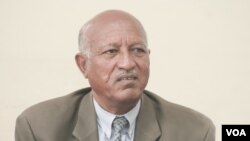This is Part Five of a five-part series on Eritrea Today
Continue to Parts: 1 / 2 / 3 / 4 / 5
Eritrea’s education minister says the country invests 45 percent of its annual budget on schooling as one of the main tools for human resource development.
Semere Russom said Eritrea places emphasis on technical education as a means of producing the necessary manpower for the country’s development.
Eritrea’s educational system starts at pre-school, and continues through elementary, junior secondary, senior secondary and tertiary levels.
Russom said the formal education system collapsed prior to independence due to over three decades of armed struggle to attain freedom. Eritrea gained its independence from Ethiopia 21 years ago.
“Educational opportunities were disrupted, but after independence, our educational system was on track, and for the last 21 years it has been going on very well,” Russom said.
For over two decades, official records show, the government has increased the number of pre-primary schools from 91 to 476, including 237 kindergartens and 239 community care giving centers.
At the elementary level, the government says enrollment jumped from 160,000 in 1991-1992 to about 311,700 in 2010-2011. Records show that over the same period, middle school enrollment increased from 28,000 to more than 100,000, and the number of technical schools also increased from two to six.
Education minister Russom said the government has also established the Eritrea Institute of Technology and six other colleges in different parts of the country.
But the U.S. State Department notes that there remains a shortage of schools and teachers at all levels, and in rural areas girls often stop going to school at a young age, in order to work at home. The report also notes that though primary education to grade 7 is tuition-free, students are required to pay for uniforms, supplies and transportation, costs which are prohibitive for some families.
In addition, in order to graduate high school and qualify for higher education, all students are required to spend their final year at a military camp -- but the State Department report says many students drop out or attempt to leave the country after grade 11 to avoid going to the camp.
And State Department also reports that Eritrea restricted academic freedom, including sanctioning teachers for their writing, research, or curriculum.
In 1991, Russom said the new nation had to begin from scratch to build up the education system, including new curriculum.
He said the government recently initiated a reformed curriculum, which he said better equips Eritrean students to compete globally.
“Students who went through our educational system in the country have been going for further education in different parts of the world [including] South Africa, United States, [the Netherlands], universities in various countries in Europe," Russom said.
"All these students have not only coped with the educational systems of these different countries but [also] they proved that they are capable of carrying whatever is needed of them and they have been doing it very successfully,” Russom said.
He said the government supports sending some students abroad to further their studies, but mandates that upon completion of their programs they return home to participate in building the country.
“We are employing a sizable number of foreign expatriate teachers from international markets. But we have an exit mechanism, whereby students who are going abroad for their further studies come back to their country and then replace the expatriate teachers,” Russom said.
Some education expert groups have sharply criticized Eritrea’s “poor and substandard” educational system. They said the system falls below international standards and is not capable of equipping students to compete on the global stage.
But, education minister Russom disagrees with the assessment.
“I wonder on what their evaluation is based," he said. "What other proof is needed to attest that the educational system of the country is sound? These students have been through our system and you found them capable of coping with the rest of the world’s higher education wherever they are going.”
He said the government realizes that education is a foundation for Eritrea’s development. He cited the government’ five-year strategic plan to help improve and transform the country’s educational system.
“In this plan, all evaluations of the education system has been made and recommendations and future plans are set for action to be taken in the five years and further as well….Human resource development is a priority in the country, and we are working very hard [to emphasize] this issue,” Russom said.
Continue to Parts: 1 / 2 / 3 / 4 / 5
Eritrea’s education minister says the country invests 45 percent of its annual budget on schooling as one of the main tools for human resource development.
Semere Russom said Eritrea places emphasis on technical education as a means of producing the necessary manpower for the country’s development.
Eritrea’s educational system starts at pre-school, and continues through elementary, junior secondary, senior secondary and tertiary levels.
Russom said the formal education system collapsed prior to independence due to over three decades of armed struggle to attain freedom. Eritrea gained its independence from Ethiopia 21 years ago.
“Educational opportunities were disrupted, but after independence, our educational system was on track, and for the last 21 years it has been going on very well,” Russom said.
For over two decades, official records show, the government has increased the number of pre-primary schools from 91 to 476, including 237 kindergartens and 239 community care giving centers.
At the elementary level, the government says enrollment jumped from 160,000 in 1991-1992 to about 311,700 in 2010-2011. Records show that over the same period, middle school enrollment increased from 28,000 to more than 100,000, and the number of technical schools also increased from two to six.
Education minister Russom said the government has also established the Eritrea Institute of Technology and six other colleges in different parts of the country.
But the U.S. State Department notes that there remains a shortage of schools and teachers at all levels, and in rural areas girls often stop going to school at a young age, in order to work at home. The report also notes that though primary education to grade 7 is tuition-free, students are required to pay for uniforms, supplies and transportation, costs which are prohibitive for some families.
In addition, in order to graduate high school and qualify for higher education, all students are required to spend their final year at a military camp -- but the State Department report says many students drop out or attempt to leave the country after grade 11 to avoid going to the camp.
And State Department also reports that Eritrea restricted academic freedom, including sanctioning teachers for their writing, research, or curriculum.
In 1991, Russom said the new nation had to begin from scratch to build up the education system, including new curriculum.
He said the government recently initiated a reformed curriculum, which he said better equips Eritrean students to compete globally.
“Students who went through our educational system in the country have been going for further education in different parts of the world [including] South Africa, United States, [the Netherlands], universities in various countries in Europe," Russom said.
"All these students have not only coped with the educational systems of these different countries but [also] they proved that they are capable of carrying whatever is needed of them and they have been doing it very successfully,” Russom said.
He said the government supports sending some students abroad to further their studies, but mandates that upon completion of their programs they return home to participate in building the country.
“We are employing a sizable number of foreign expatriate teachers from international markets. But we have an exit mechanism, whereby students who are going abroad for their further studies come back to their country and then replace the expatriate teachers,” Russom said.
Some education expert groups have sharply criticized Eritrea’s “poor and substandard” educational system. They said the system falls below international standards and is not capable of equipping students to compete on the global stage.
But, education minister Russom disagrees with the assessment.
“I wonder on what their evaluation is based," he said. "What other proof is needed to attest that the educational system of the country is sound? These students have been through our system and you found them capable of coping with the rest of the world’s higher education wherever they are going.”
He said the government realizes that education is a foundation for Eritrea’s development. He cited the government’ five-year strategic plan to help improve and transform the country’s educational system.
“In this plan, all evaluations of the education system has been made and recommendations and future plans are set for action to be taken in the five years and further as well….Human resource development is a priority in the country, and we are working very hard [to emphasize] this issue,” Russom said.














